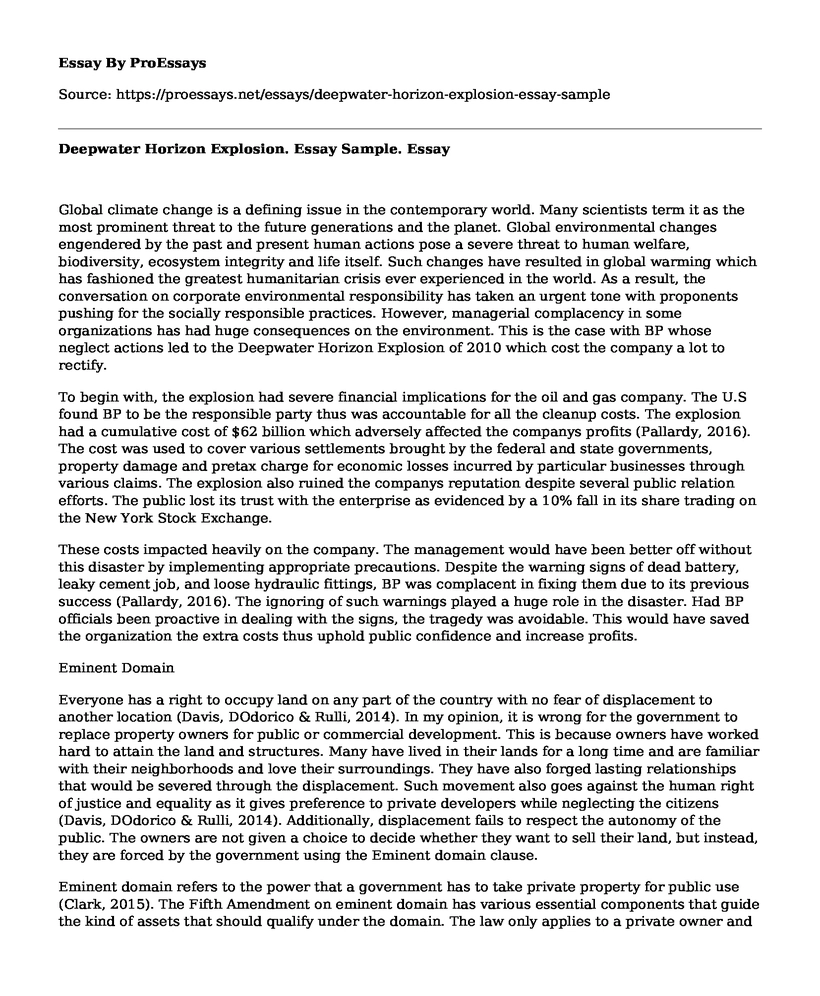Global climate change is a defining issue in the contemporary world. Many scientists term it as the most prominent threat to the future generations and the planet. Global environmental changes engendered by the past and present human actions pose a severe threat to human welfare, biodiversity, ecosystem integrity and life itself. Such changes have resulted in global warming which has fashioned the greatest humanitarian crisis ever experienced in the world. As a result, the conversation on corporate environmental responsibility has taken an urgent tone with proponents pushing for the socially responsible practices. However, managerial complacency in some organizations has had huge consequences on the environment. This is the case with BP whose neglect actions led to the Deepwater Horizon Explosion of 2010 which cost the company a lot to rectify.
To begin with, the explosion had severe financial implications for the oil and gas company. The U.S found BP to be the responsible party thus was accountable for all the cleanup costs. The explosion had a cumulative cost of $62 billion which adversely affected the companys profits (Pallardy, 2016). The cost was used to cover various settlements brought by the federal and state governments, property damage and pretax charge for economic losses incurred by particular businesses through various claims. The explosion also ruined the companys reputation despite several public relation efforts. The public lost its trust with the enterprise as evidenced by a 10% fall in its share trading on the New York Stock Exchange.
These costs impacted heavily on the company. The management would have been better off without this disaster by implementing appropriate precautions. Despite the warning signs of dead battery, leaky cement job, and loose hydraulic fittings, BP was complacent in fixing them due to its previous success (Pallardy, 2016). The ignoring of such warnings played a huge role in the disaster. Had BP officials been proactive in dealing with the signs, the tragedy was avoidable. This would have saved the organization the extra costs thus uphold public confidence and increase profits.
Eminent Domain
Everyone has a right to occupy land on any part of the country with no fear of displacement to another location (Davis, DOdorico & Rulli, 2014). In my opinion, it is wrong for the government to replace property owners for public or commercial development. This is because owners have worked hard to attain the land and structures. Many have lived in their lands for a long time and are familiar with their neighborhoods and love their surroundings. They have also forged lasting relationships that would be severed through the displacement. Such movement also goes against the human right of justice and equality as it gives preference to private developers while neglecting the citizens (Davis, DOdorico & Rulli, 2014). Additionally, displacement fails to respect the autonomy of the public. The owners are not given a choice to decide whether they want to sell their land, but instead, they are forced by the government using the Eminent domain clause.
Eminent domain refers to the power that a government has to take private property for public use (Clark, 2015). The Fifth Amendment on eminent domain has various essential components that guide the kind of assets that should qualify under the domain. The law only applies to a private owner and the land taken should be used for public use. Also, the Fifth Amendment requires property owners to receive fair compensation. The price of the land depends on the market value which is the price that the owner would have sold their property if they were willing to trade. However, the acquisition of such land for private uses goes against the constitution making it illegal. Therefore, people should have the opportunity to air their views. Displacement for private development should only occur if the owners are willing to sell their land and compensation done fairly.
Reference
Clark, J. A. (2015). Eminent Domain and Expropriation: A Comparison between Fifth Amendment Precedent and Latin American Land Redistribution. Regent UL Rev., 28, 319.
Davis, K., DOdorico, P., & Rulli, M. (2014). Land grabbing: a preliminary quantification of economic impacts on rural livelihoods. Population and Environment, 36(2), 180-192.
Pallardy, R. (2016). Deepwater Horizon oil spill of 2010 | oil spill, Gulf of Mexico. Encyclopedia Britannica. Retrieved 11 February 2017, from https://www.britannica.com/event/Deepwater-Horizon-oil-spill-of-2010
Cite this page
Deepwater Horizon Explosion. Essay Sample.. (2021, Apr 05). Retrieved from https://proessays.net/essays/deepwater-horizon-explosion-essay-sample
If you are the original author of this essay and no longer wish to have it published on the ProEssays website, please click below to request its removal:
- Green Roof and Thermal Performance: Articles Review Example
- Paper Example on Physical and Chemical Weathering
- Criminal Investigation on the War Crime Paper Example
- Correction Systems Essay Example
- Pereboom's Libertarian Account for Human Choices: Bridging the Gap - Essay Sample
- Mass Shootings in NY: Gun Control Debates Intensify - Essay Sample
- Air Pollution and City Populations: Global Comparison - Essay Sample







